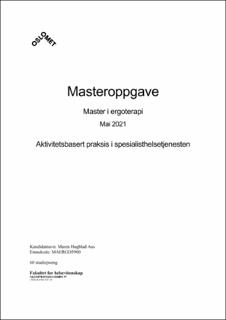| dc.contributor.advisor | Bonsaksen, Tore | |
| dc.contributor.author | Aas, Maren Høgblad | |
| dc.date.accessioned | 2024-03-22T08:45:14Z | |
| dc.date.available | 2024-03-22T08:45:14Z | |
| dc.date.issued | 2021-05 | |
| dc.identifier.uri | https://hdl.handle.net/11250/3123728 | |
| dc.description.abstract | Bakgrunn: I spesialisthelsetjenesten er det en spenning mellom en medisinsk forståelsesmodell og aktivitetsbasert praksis. Tidligere forskning viser at ergoterapeuter verdsetter aktivitetsbasert praksis, men at de bruker mindre tid på denne tilnærmingen og mer tid på kroppsfunksjonstrening. En rekke barrierer kan stå i veien for aktivitetsbasert praksis.
Mål: Studiens mål var å undersøke tre aspekter ved aktivitetsbasert praksis blant ergoterapeuter i spesialisthelsetjenesten: deres holdninger til, bruk av og opplevde barrierer for aktivitetsbasert praksis. Videre var studiens mål å undersøke sammenhenger mellom sosiodemografiske faktorer, jobberfaring, rapporterte barrierer og aktivitetsbasert praksis.
Metode: En kvantitativ tverrsnittsstudie ble utført. Et spørreskjema ble utformet spesielt til denne studien. Ergoterapeuter i spesialisthelsetjenesten ble invitert til å delta. Datamaterialet ble analysert med deskriptiv statistikk, og sammenhenger ble undersøkt med logistisk regresjon.
Resultater: Det var 124 ergoterapeuter som deltok. Ergoterapeutene mente at aktivitetsbasert praksis er viktig, og de rapporterte selv at de bruker tilnærmingen ofte og i stor grad. Av de konkrete kartleggings- og intervensjonsmetodene som ble rapportert brukt, ble 26% av kartleggingen og 38% av intervensjonene klassifisert som aktivitetsbaserte. Mangel på tid, plass og utstyr ble rapportert som de største barrierene, og flere faktorer hadde sammenheng med selvrapportert aktivitetsbasert praksis.
Konklusjon: Deltakerne verdsatte aktivitetsbasert praksis, mens de konkrete kartleggings- og intervensjonsmetodene som ble rapportert hovedsakelig ikke var aktivitetsbaserte. Flere barrierer ble rapportert som hindringer og flere av disse hadde en sammenheng med mindre bruk av aktivitetsbasert praksis.
Nøkkelord: Aktivitetsbasert praksis, ergoterapi, spesialisthelsetjenesten, spørreundersøkelse | en_US |
| dc.description.abstract | Background: In hospitals and rehabilitation institutions there is a tension between practice based on a medical model and an occupation-based practice. Previous research shows that while occupational therapists value occupation-based practice, they spend less time on this approach and more time on impairment-based practices. Several barriers are reported as obstacles for the approach.
Aim: This study aimed to explore three aspects of occupation-based practice among occupational therapists working in hospitals and rehabilitation institutions: their attitudes towards occupation-based practice, their use of it, and their perceived barriers for implementing it. Further, the study aimed to examine associations between sociodemographic factors, work experience, reported barriers, and occupation-based practice.
Methods: This study had a cross-sectional, descriptive design based on survey methodology. A survey was designed specifically for this study. Occupational therapists working in hospital and rehabilitation institutions were invited to participate. The data was analyzed using descriptive statistics and associations were examined using logistic regression.
Results: A total of 124 occupational therapists participated. The results showed that the therapists value occupation-based practice and reported using it frequently and to a large extent. Of the reported assessment and intervention methods used, 26% of the assessments, and 38% of the interventions were classified as occupation-based. Lack of time, space and equipment were reported as the largest barriers, and multiple factors were associated with self-reported level of occupation-based practice.
Conclusion: The participants valued occupation-based practice, while the assessment and intervention methods reported were mainly not occupation-based. Multiple barriers were reported as obstacles and several of these were associated with less use of occupation-based practice.
Keywords: occupational therapy, occupation-based practice, hospital setting, survey, rehabilitation setting | en_US |
| dc.language.iso | nob | en_US |
| dc.title | Aktivitetsbasert praksis i spesialisthelsetjenesten | en_US |
| dc.type | Master thesis | en_US |
| dc.description.version | publishedVersion | en_US |
